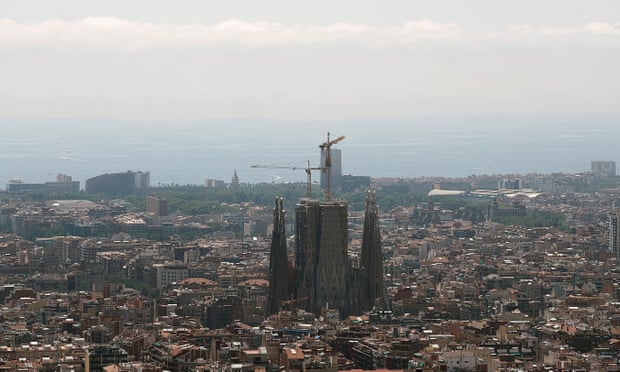The largest low-emissions zone in southern Europe opens in Barcelona on New Year’s Day, banning the most polluting vehicles from entering an urban area including the city and some satellite towns.
Petrol-driven cars bought before 2000 and diesels older than 2006 will be banned and face a fine of €100-€500 (£85-£425) each time they enter the zone. A moratorium will be in place for the first three months, during which time offenders will receive notification of the infraction but will not be fined.
Unlike a similar zone in central Madrid, the Barcelona ban covers the entire metropolitan area. In the Madrid zone, levels of nitrogen dioxide (NO²) fell by 48% in a year. Both cities frequently exceed World Health Organization levels for NO² and other pollutants.
The Barcelona zone covers 95 sq km – 20 times the size of the Madrid one – and encompasses four satellite towns in addition to the city area itself. It will be monitored by 150 cameras.
Janet Sanz, the deputy mayor in charge of mobility, said Barcelona hoped to reduce the number of cars in the city by 125,000 within three years, and air pollution by 20% within four.
If these targets were not met, Sanz said, Barcelona would consider introducing a London-style congestion charge for all vehicles entering the city.
“It’s about the democracy of public space and public health,” she said. “It’s a combination of reducing pollution but reconfiguring public space so that everyone can enjoy it.”
The low-emissions zone is designed to complement the city’s so-called superblocks scheme, in which areas made up of nine city blocks are closed to through traffic and partly pedestrianised.
There are currently six superblocks, with 11 more at various stages of completion. The plan envisages a total of 503 encompassing almost all the city.
Inevitably, the scheme has its opponents who argue it will affect business and force people to buy newer, cleaner vehicles. Sanz denies this, claiming it will encourage people to use the city’s excellent public transport system.
To this end the transport authority has introduced new tariffs, including a travel card offering unlimited journeys on public transport within the metropolitan area for €40 a month.
There will also be a one-year moratorium for owners of banned vehicles who can prove they earn less than €8,000 a year, and for delivery vehicles. All banned vehicles will be allowed to enter the city 10 times a year.








































admin in: How the Muslim Brotherhood betrayed Saudi Arabia?
Great article with insight ...
https://www.viagrapascherfr.com/achat-sildenafil-pfizer-tarif/ in: Cross-region cooperation between anti-terrorism agencies needed
Hello there, just became aware of your blog through Google, and found ...